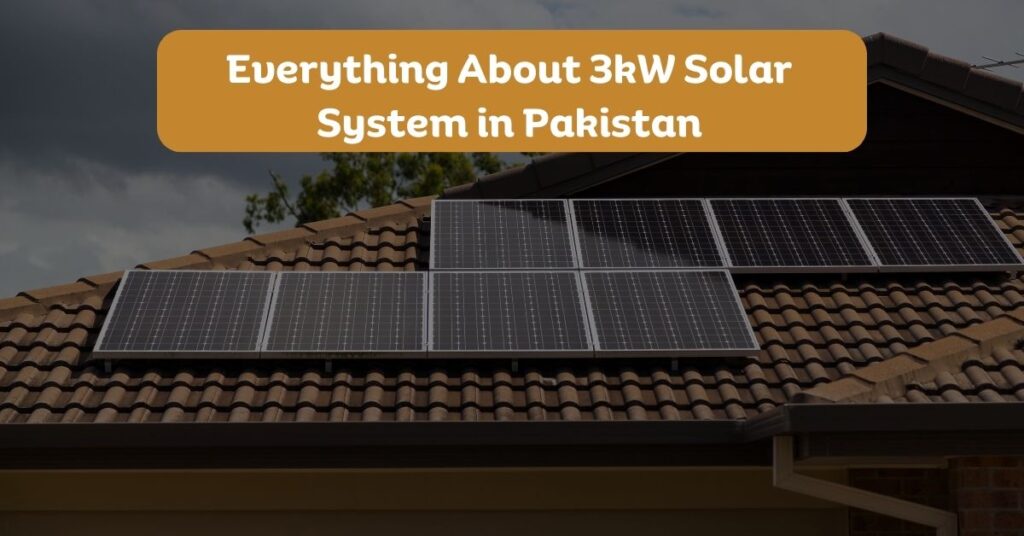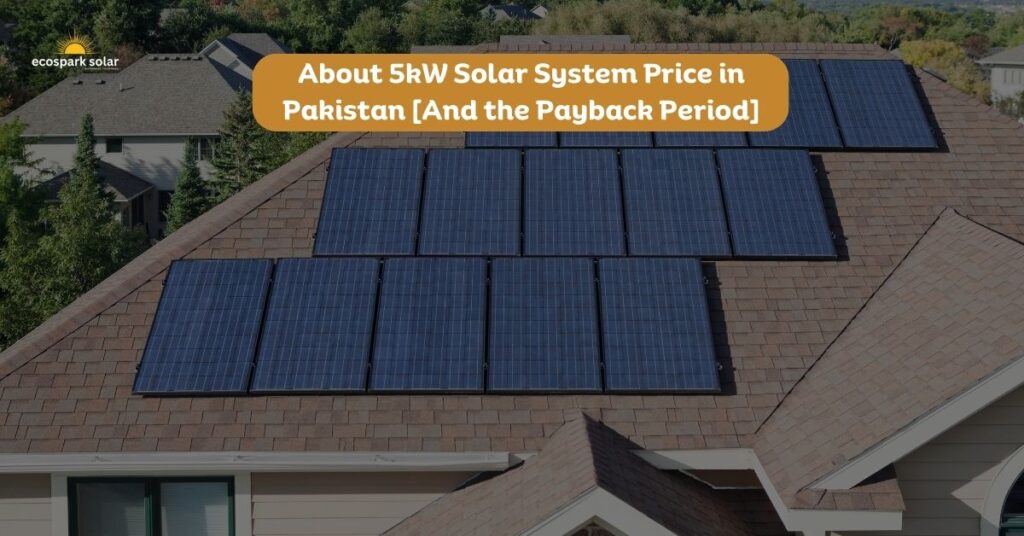A 5kW solar system would usually be the go-to system for many Pakistani households. If you are a homeowner with modest energy needs and have decided to install a 5kW solar system, you may wonder: How much power does a 5kW solar system produce in Pakistan?
Generally speaking, a 5kW solar system can produce enough electricity to power a mid-sized home or business. However, the actual amount of power that a 5kW solar system produces in Pakistan will vary depending on a number of factors.
In this article, we will take a closer look at all the things that affect the power output of a 5kW solar system.
- How to calculate the amount of energy generated by a 5kW solar system?
- How much power does a 5kW solar system produce in Pakistan?
- What are some of the factors that affect the 5kW solar system’s production capacity?
- How much does a 5kW solar system produce in Islamabad? And similarly, Karachi, Peshawar, Quetta, Lahore, etc.
- How to maximize the energy generated by a 5kW solar system?
We will start with the factors, as we will keep these factors into account when calculating the production of a 5kW system.
Factors Affecting Solar Power Production of 5kW Systems
Not all 5kW solar systems produce the same amount of power. A system of similar specifications would generate different power in two different locations. Conversely, two systems with components of different brands would generate different power in the same location.
This is due to certain factors, such as:
- Solar irradiance
- Panel efficiency
- Panel orientation and tilt angle
- Shading and obstructions
- Dust and debris
Your Location
The amount of sunlight a solar system receives depends upon the location. Pakistan receives around 4 to 7 kWh/m2/day of solar irradiation, which is sufficient for generating electricity. In simple words, 4 to 7 kWh/m2/day means 4 to 7 peak sun hours. However, sunlight availability can vary based on the time of year and the location in Pakistan.
Please note that peak sun hours never means for how much time the sun shines above—it means the kind of sunlight that stimulate panels to generate electricity. In Islamabad, the peak sun hours are 5.5 per day. Explore more about solar irradiance in Pakistan by heading to our detailed write-up on peak sun hours in Pakistan.
The Efficiency of the System
This is simple. The more efficient your system (solar panels and inverter) is, the higher would be its output. The average efficiency of solar panels in Pakistan is around 18%. But the latest panels coming offer around 20% efficiency. The market is flooded with a variety of solar panels—it is advisable to choose tier-1 solar panels as they are the most efficient and ensure better system performance.
Similarly, choose inverters of good quality. The efficiency must be above 95% and must come with a reasonable warranty period.
When calculating power output, an efficiency factor of 0.8 is generally considered. We will use that in our formula in the next sections of this article.
The Tilt Angle and Orientation of Solar Panels
The orientation and elevation angle, also called the tilt angle, of solar panels is another factor that would impact how much power your 5kW solar system produces. The ideal orientation for solar panels in Pakistan is facing south, at 180 degrees. Additionally, the tilt angle should match the latitude of the installation location. Pakistan lies in the 23-37 latitude range; the tilt angle would correspond to the latitude of your area.
For instance, in Islamabad, a tilt angle of 33 degrees is recommended—but you can keep it 30 as well. Want to know more about calculating these angles? Read how to calculate orientation and elevation angle for your solar system.
| You May Like to Read: 5kW Solar System Price in Pakistan [And the Payback Period and Return on Investment] |
Shading and Obstructions
Shading from nearby structures, trees, or other obstructions can reduce the power output of solar panels. It is important to install the panels in locations with minimal shading to maximize energy production. If there is shading, make sure to make arrangements that would keep the impact of shading minimal. One alternative would have been to use micro-inverters. But sadly, I have never come across micro inverters in the Pakistan.
So, you would have to neutralize the sources of shading. Being a company that promotes sustainability, we won’t recommend felling tress if that’s the source. You can, however, transfer it from one place to another.
A solar system for everyone.
We’re customer-centric; we will find you a solution within your budget. Whatever your project size, you can always save with Ecospark Solar.
Dust and Debris on Your Panels
Accumulation of dust, debris, or bird droppings on the panels can affect the amount of sunlight your panels absorb. That’s why regular cleaning of solar panels is crucial to ensure optimal sunlight absorption.
Now that we have discussed all the factors, it is time to assess how much power a 5kW solar system can produce.

How Much Power Does a 5kW Solar System Produce?
A typical 5kW solar system in Pakistan can produce between 17 and 22 kWh of electricity per day. This translates to approximately 510 to 660 units per month. The needs of an average Pakistani household, with one air conditioner, are around 500-600 units. That means 5kW solar systems are suitable for most Pakistani homes or small businesses.
Want to know how did we calculate this? Read on.
To calculate the energy generated by one solar panel, we use the following formula:
| Daily production of a solar panel = Solar panel capacity x Peak sun hours x Efficiency factor |
We will do this for a 5kW solar system. Let’s keep 5 peak sun hours and an efficiency factor of 0.8.
| Daily Production of 5kW System = 5,000 watts x 5 x 0.8 = 20 kWh (units) |
Note that the actual power generated by your 5kW solar system may vary depending on the installation location of your system, weather conditions, and system efficiency.
To calculate the monthly output, simply multiply the daily generation capacity by 30.
| Monthly Production of 5kW System = Daily Production x 30 = 20 x 30 = 600 kWh (units) |
How much power does a 5kW system produce in different cities of Pakistan?
The power generation potential of a 5kW solar system can vary slightly across different cities in Pakistan due to variations in solar irradiation levels.
Here’s a breakdown of power production estimates in some major cities:
How much power does a 5kW system produce in Islamabad?
Islamabad/Rawalpindi receives 5.5 kWh/m2/day of solar irradiation—or 5.5 peak sun hours per day. That means a 5kW solar system in Islamabad/Rawalpindi can produce an average of 18-22 kWh of electricity per day or approximately 540 to 660 units per month. Perfect place for going solar, isn’t it? Oh, and the net metering in Islamabad makes it even more exciting!
How much power does a 5kW system produce in Karachi?
A 5kW solar system in Karachi can generate an average of 17-20 kWh of electricity per day, equivalent to 510 to 600 monthly units. Karachi receives an average of 5.2 kWh/m2/day of solar irradiation, which is comparable to the national average. Quite a decent figure!
How much power does a 5kW system produce in Lahore?
5kW solar systems in Lahore usually generate an average of 18-22 kWh of electricity per day, approximately equal to Islamabad’s power production. This is due to Lahore’s average solar irradiation of 5.4 kWh/m2/day.
How much power does a 5kW system produce in Peshawar?
Considering 5.3 peak sun hours per day, a 5kW solar system in Peshawar can produce an average of 17-21 kWh of electricity per day.
How much power does a 5kW system produce in Quetta?
A 5kW solar system in Quetta can generate an average of 16-19 kWh of electricity per day. Quetta receives an average of 5.1 kWh/m2/day of solar irradiation. In summer, this figure could be even higher than Islamabad.
Again a disclaimer: The figures mentioned here are only estimates. The actual power generated would be different based on the factors mentioned above. For instance, a solar system consisting of tier-1, A-grade solar panels would generate more power than a system consisting B-grade solar panels.
What can you run with a 5kW solar system?
A 5kW solar system can power a wide range of appliances in a typical home or business. For example, you can run 5 fans, 10 lights, 1 AC 1.5 tons, 1 iron, 1 refrigerator, 1 LED TV, 1 washing machine. It is important to note that the actual appliances that can be run on a 5kW solar system will depend on the efficiency of the solar panels, the amount of sunlight in the area, and the usage patterns of the appliances.
How to Maximize the Power Output of Your 5kW Solar System?
There are a few things you can do to maximize the power output of your 5kW solar system:
- Choose high-quality solar panels with higher efficiency ratings. Don’t go for substandard panels or inverters—it’s an investment and should be considered an investment.
- Ensure proper panel orientation and tilt angle. Of course! Let professional installers take care of that.
- Regularly clean and maintain the panels to remove any dust or debris.
- Monitor system performance to identify any issues or inefficiencies.
- Minimize shading by selecting an appropriate installation location.
This is all about how much power does a 5kW solar system generate. You can read more about:
Conclusion
A 5kW solar system is a good option for medium-sized homes and businesses in Pakistan. It can produce enough electricity to meet the needs of small households and businesses and can power all the necessary appliances. It is a cost-effective way to reduce electricity bills, increase energy independence, and help the environment.
That’s all about 5kW solar system. If you want to go solar, how about we help you? We are expert in what we do! With a scientific approach to solar, we ensure that our clients make the most of their solar journey – at affordable rates! Contact us, and go solar the right way.



